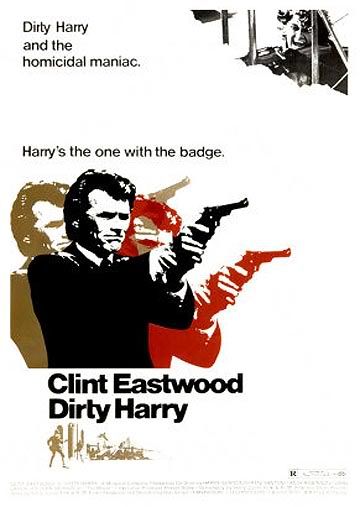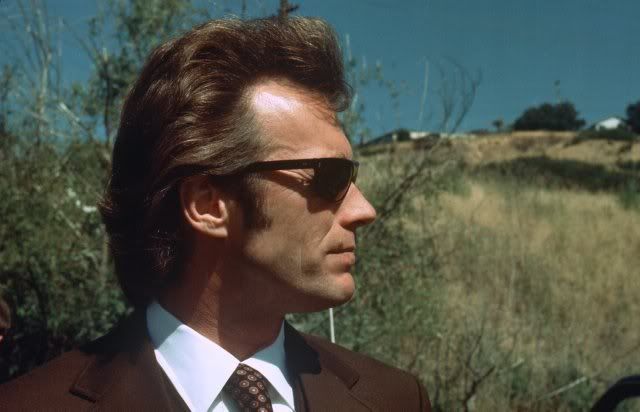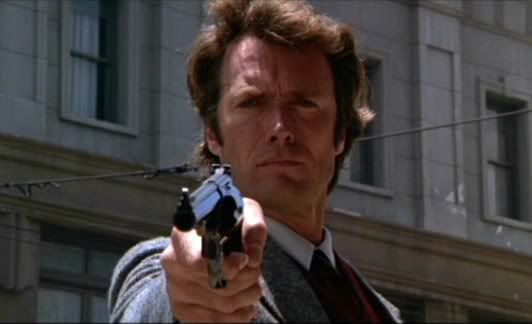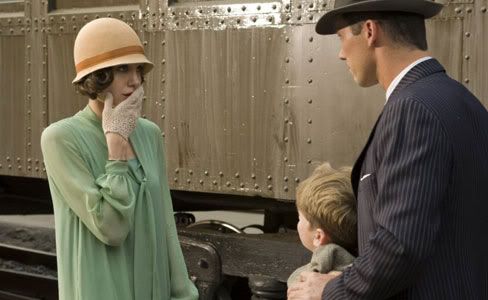
[audio:http://www.blueinkalchemy.com/uploads/dirty_harry.mp3]
In an ideal world, police officers are sworn to serve the public trust, protect the innocent and uphold the law. Even in our fiction, even when they’re no longer fully human, we’d like to think that there’s some sort of compassionate protection between those of us abiding by the law and those driven to defy it. And in our minds, these men and women are paragons of virtue, living embodiments of justice, the sort of good-souled citizens that chase down purse-snatchers and rescue cats from trees. We don’t like to think of them doing things like beating a suspect bloody in view of the public or abusing their power to assault the innocent even if they’re irate. But they often do, and such a policeman who does these sort of bad things, for good reasons or no, is the one introduced to us at the titular character of 1971’s Dirty Harry.

His full name is Inspector Harry Callahan, and his fellows in the precinct call him ‘dirty’ due to the habit of nasty business falling into his lap. The man can’t even eat a hot dog without running into a bank robbery he has to foil. The main thrust of the narrative is Callahan’s chase of a serial killer calling himself ‘Scorpio’. It takes quite a bit to track this maniac down. However, when Harry’s over-zealous pursuit of Scorpio when the killer kidnaps a little girl leads to the villain’s release on a technicality. Harry must take the law in his own hands if he wants to see justice done to the murder, even if it means dirtying his hands further and perhaps even ending his career.
Until this film, Clint Eastwood was mostly known for spaghetti westerns and a stint on Rawhide. It would be Harry Callahan that catapulted him to stardom. The detective would be quite good not just for his acting career but also helping him develop as a director, though his first time behind the camera actually came the same year with Play Misty For Me. He’d go on to be a highly successful and iconic actor as well as an acclaimed, thoughtful and powerful director, but in 1971 he was busy setting the foundation for all sorts of future cop dramas and their actors, from Charles Bronson to Bruce Willis.

At least he has nice shades.
And make no mistake, this flick’s very much a product of the ’70s. A good deal of its content is nowhere near what we would consider politically correct today. The presence of blood so fake I was wondering if they used ketchup or hot sauce is counterbalanced with nudity that goes over the line of tasteful into gratuitous territory. There’s some casual racism, a soundtrack from the creator of the Mission: Impossible theme best described as ‘groovetastic’ and more drab suits with hideous patterns than you can shake a magnum revolver at. None of these things, however, caused as much a stir at the time as Dirty Harry’s behavior.
He breaks into places without a warrant, beats information out of suspects while they scream for lawyers and doesn’t think twice about executing someone in cold blood. This staightforward portrayal of personal justice had many critics at the time calling the message of the film ‘fascist’. But Harry does not exist in a vacuum. Not only is he driven to these ends by the actions of someone truly depraved and irredeemable, he is fully aware of how these things can and do affect him. When he’s got Scorpio under his heel, his expression is of a man tortured by the knowledge that he may be too late to save a little girl’s life. And in the end, when all is said and done, he tosses away his badge, knowing that his actions have served nobody but himself, and protected no one.

The famous handgun.
It’s this strong if morally ambiguous internal compass of his, coupled with his fortitude and excellent skills at delivering snark that made Dirty Harry into an iconic character. He’s cited as an inspiration for multiple film series, including Death Wish, Lethal Weapon and Die Hard. Pretty much any iteration of hard-nosed, take-no-prisoners vigilante justice can be traced back to his actions, from the Boondock Saints to modern interpretations of the goddamn Batman. And while Arnold and Sly may run around battlefields with bulging muscles and big machine guns, a single slender man in a suit with a revolver can be ten times as compelling and chilling, especially if that man is Clint Eastwood and that revolver is the Smith & Wesson Model 29 chambered in .44 magnum.
Even if it wasn’t a landmark piece of work, Dirty Harry is still a good watch. It is definitely showing its age in some places, from the width of its steel sedans to the archaic radio equipment Harry and his partner have to deal with. However, Eastwood carries much of the film’s drama, action and even humor, and would do so in future films. For fans of thrillers, cop films and examinations of absolute powers of justice in the hands of one man, Dirty Harry is definitely recommended. You’ll definitely have a better understanding of why would-be macho cops sometimes squint their eyes and ask punks if they feel lucky.
Josh Loomis can’t always make it to the local megaplex, and thus must turn to alternative forms of cinematic entertainment. There might not be overpriced soda pop & over-buttered popcorn, and it’s unclear if this week’s film came in the mail or was delivered via the dark & mysterious tubes of the Internet. Only one thing is certain… IT CAME FROM NETFLIX.



